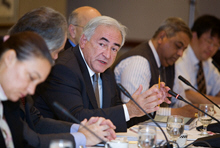
Typical street scene in Santa Ana, El Salvador. (Photo: iStock)
IMF Survey: Strauss-Kahn Seeks to Quickly Refocus IMF
December 7, 2007
- Reforms aim at IMF's relevance and legitimacy, financial soundness
- Goal is to overhaul the institution swiftly
- Steps will involve cuts in institution's budget, staff numbers
Dominique Strauss-Kahn, who took over as Managing Director of the IMF in November, has initiated a process to swiftly overhaul the institution to make it more effective.

Strauss-Kahn: "We have to go further, and we have to go faster. And we have to do that in circumstances that are not easy" (IMF photo)
IMF ACTIVITIES AND FINANCES
He has launched an internal reform effort aimed at tackling what he describes as "the twin issues of the Fund's relevance and legitimacy, and the Fund's financial soundness."
"These challenges offer us the opportunity to be even more focused, lean and responsive," he says, "a Fund for the 21st century."
Strauss-Kahn emphasizes that the IMF was established to provide the "global public good" of financial stability. The objective, he says, is to strengthen and improve its activities in pursuit of this overarching objective. "How can our contributions be made even more relevant to our members? And how can we strengthen the sense of ownership in our institution? "
While noting that the IMF's ongoing medium-term strategy—which aims at reforms in a number of its core areas including economic/financial surveillance and quota representation—was "a very important step forward, " he adds that "we have to go further, and we have to go faster. And we have to do that in circumstances that are not easy."
Changing needs
The drive to refocus the Fund's operations while tackling the need to introduce a new income model for the 185-member institution will involve a significant reduction in both the Fund's budget expenditures and staff numbers—to better align them with the changing needs of its global membership. The Fund's governing body, the IMFC, has asked the Fund for specific proposals on a new income model and expenditure framework by the time of the IMF spring meetings to be held in April 2008. Without changes, the IMF could face a shortfall of $400 million a year by 2010.
Although the IMF does not face an immediate financing crisis, a committee of eminent persons set up to study the issue (the Crockett group) acknowledged earlier this year that continuing to rely on income from lending is not a sustainable model for the Fund. The committee recommended that the IMF adopt a package of income-generating measures, including investing a portion of the Fund's quota resources contributed by its member governments and some limited sales of its gold holdings.
Strauss-Kahn has emphasized that "the expenditure reductions must be linked with agreement on a new income model, and also with refocusing and reform of the Fund's operations—so that we emerge better able to fulfill our mandate."
Budget savings
Strauss-Kahn has indicated that the planned restructuring could involve budget savings of around $100 million per year and staff reductions in the 300-400 range. The IMF currently has more than 2,600 staff.
The new Managing Director has set up a number of staff working groups to consider how the IMF can strengthen its activities in a globalized economy. He has also established an external advisory group, comprising Stanley Fischer (currently Governor of the Israeli central bank and a former First Deputy Managing Director of the IMF); Alassane Ouattara, (a former IMF Deputy Managing Director and former Prime Minister of Côte d'Ívoire); and Tim Adams (a former Under Secretary for International Affairs at the U.S. Treasury).
"The coming months will inevitably be a period of rapid change," says Strauss-Kahn, adding he is confident that it will lead to "an even stronger Fund for the future."


